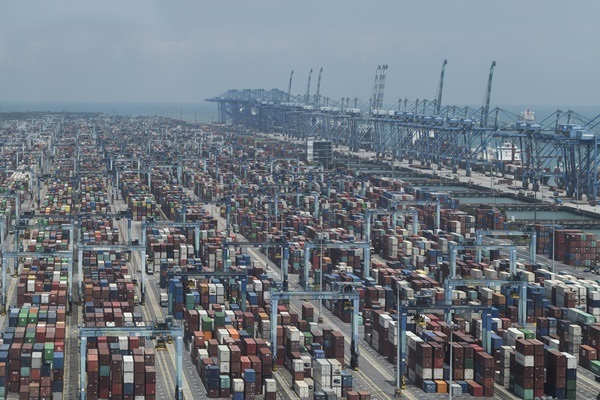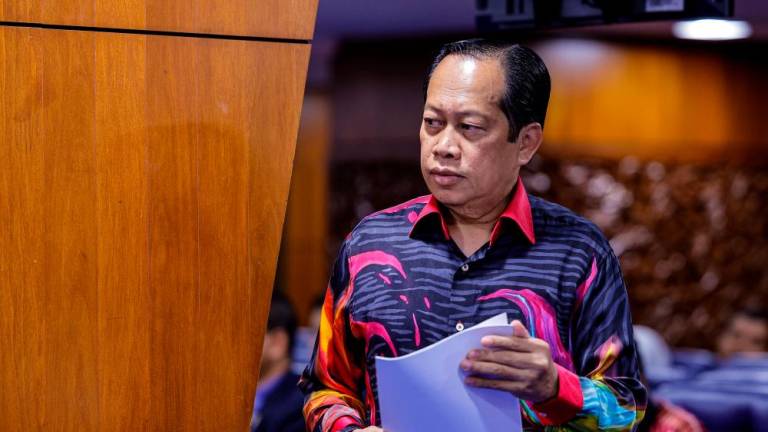Malaysia’s GDP seen growing faster at 4.8% in 2020
> Gross domestic product (GDP) growth is projected to improve marginally to 4.8% in 2020 from 4.7% in 2019.
> Household spending, which accounts for 58% of GDP, will continue to spearhead growth, supported by a stable labour market and benign inflation.
> Domestic demand is expected to expand 4.8% in 2020 against 4% in 2019
> Private consumption is estimated to grow 6.9% in 2020 from 6.8% in 2019, underpinned by sustained economic activities, including major events such as Visit Malaysia 2020, Apec meetings and World Congress on Information Technology 2020.
> Private investment is expected to rise 2.1% in 2020 from 1.5% in 2019, given the resumption of strategic projects and higher exports, particularly electrical and electronics.
> However, public consumption is projected to remain moderate at 2% in 2019 and 1.5% in 2020, in line with the fiscal consolidation path.
Exports to expand 1% in 2020, current account surplus to narrow to RM29b
> In 2020, overall gross exports are expected to expand 1% benefiting from the anticipated improvement in global trade activities and the uptick in the electrical and electronics cycle. This compares with an estimated 0.1% increase in gross exports for 2019.
> Gross imports are projected to turnround 2.7% in 2020 from a 2.5% contraction in 2019, in line with higher imports of intermediate, capital and consumption goods.
> Current account surplus is expected to narrow to RM29 billion or 1.9% of gross national income in 2020 from RM43 billion or 2.9% of GNI in 2019.
> Inflation is projected to expand 2% in 2020, mainly due to the expected introduction of targeted fuel subsidy.
Household debt up slightly to RM1.22 trillion
> Overall household debt increased slighly to RM1.22 trillion, accounting for 82.2% of GDP as at end-June 2019.
> However, the debt level has been moderating since 2015 following macro-prudential measures and financial literacy programmes introduced to rein in household levels.
> Household financial assets remain strong at RM2.63 trillion with the debt servicing capacity of household remained intact, supported by stable income and employment growth.
> The banking system’s loan quality remained sound with stable net impaired loans ratio of 1% as at end-July 2019.
Federal government revenue at RM244.5b for 2020, lower than RM263.3b for 2019
> Federal government revenue is expected to be RM244.5 billion or 15.2% of GDP for 2020.
> Collection of tax revenue higher at RM189.9 billion.
> Non-tax revenue at RM54.6 billion.
> Total expenditure forecast at RM297 billion or 18.4% GDP.
> Higher growth of 13.1% to RM263.3 billion anticipated for 2019 due to one-off Petronas dividend.
Fiscal deficit higher at 3.2% for 2020, to average 2.8% over 3-year period
> The 2020 deficit target of 3.2% of GDP is slightly higher than the 3% originally announced in Budget 2019, but remains on a consolidation path.
> Fiscal deficit is expected to remain at 3.4% of GDP for 2019.
> The Medium-Term Fiscal Framework 2020-2022 has been adopted as a tool for medium-term fiscal planning.
> Total revenue is forecast at RM764.9 billion (15% of GDP).
> Non-petroleum revenue is expected to contribute RM615.7 billion (12.1% of GDP).
> Petroleum-related revenue is projected at RM149.2 billion (2.9% of GDP).
> Total indicative ceiling for expenditure is estimated at RM910.4 billion (17.8% of GDP).
> Operating expenditure allocation RM751.4 billion (14.7% of GDP).
> Development expenditure allocation RM159 billion (3.1% of GDP).
> Fiscal deficit targeted to average 2.8% of GDP over three-year period.
RM297b government expenditure allocated for Budget 2020
> A total of RM297 billion (18.4% of GDP) will be allocated for Budget 2020, of which RM241 billion (14.9% of GDP) will go to operating expenditure and the balance of RM56 billion will go to development expenditure.
> The bulk of the operating expenditure will be channelled to emoluments, followed by supplies and services, debt service charges, retirement charges as well as subsidies and social assistance.
> Development expenditure will be channelled towards promoting economic development, bridging the urban-rural infrastructure gap and enhancing the living standard of people.
> Allocation for 2019 revised upwards to RM316 billion from budget estimates of RM314.63 billion to cater for higher operating expenditure (RM262.3 billion or 17.3% of GDP), while development expenditure constitutes RM53.7 billion or 3.5% of GDP which will be spent on programmes and projects with a high-multiplier impact on the economy.
Federal government debt closes to RM800b or 52.7% of GDP
> As at end-June 2019, federal government debt stood at RM799.1 billion (52.7% of GDP).
> Debt comprises 96.3% of ringgit-denominated securities, and the balance of 3.7% is from offshore borrowings mainly in US dollar and yen.
> Domestic debt stood at RM769.9 billion.
> External debt was at RM931.1 billion (63.1% of GDP). The slight increase was due to a sizeable increase in medium- and long-term offshore borrowing.
> As at end-June 2019, total federal government debt and liabilities exposure was estimated at RM1.17 trillion or 77.1% of GDP, due to an increase in federal government debt and committed guarantees.
> The government is committed to its debt consolidation path with a targeted debt-to-GDP ratio below 50% in the medium term.
Government has extended RM8.9b to 1MDB
> As at end-June 2019, the government has extended an advance of RM8.9 billion to 1Malaysia Development Bhd (1MDB) for debt servicing.
> The government is also in the process of recovering several assets related to 1MDB’s financial trail.
> As at end-June, the government has received about RM920 million, from the recovered assets, which will be utilised to serve 1MDB’s debt obligations.














